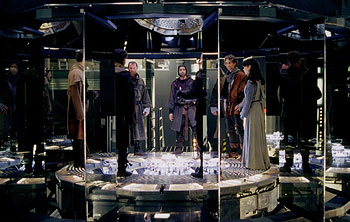Timeline Review (minor spoilers)
I had already read the book by Michael Chricton, so I was prepared to see a lot of it get tossed out and changed in the film version. And that’s pretty much what happened. Though generally faithful to the book, a great deal was changed, and not all to the film’s benefit. Still, the movie turned out a bit better than I had expected, and I’m not disappointed that I went to see it.
The general story is that a team of archaeologists working on a site in France come across a 650-year-old set of papers that include a plea for help from the team’s leader, Professor Johnston, who just recently went to visit a tech company in the U.S. that was funding the dig and the restoration of the site. Members from the team visit the tech company and learn that they have a functional time machine, and the professor went back to a time during the Hundred Years War between France and England, and did not return.
 So off the team goes to medieval France, and things quickly go wrong. An inopportune attack by horsemen cause the team to split up, and one team member returns in a way that disables the time machine. The machine must be repaired within a certain amount of time, or the team will never be able to return. The team, meanwhile, must suffer the vagaries of the 14th century, and somehow regroup, find the professor, and return within the same time frame.
So off the team goes to medieval France, and things quickly go wrong. An inopportune attack by horsemen cause the team to split up, and one team member returns in a way that disables the time machine. The machine must be repaired within a certain amount of time, or the team will never be able to return. The team, meanwhile, must suffer the vagaries of the 14th century, and somehow regroup, find the professor, and return within the same time frame.
Chricton’s book had a great many more interesting points to it, as books, with much more space for exposition, are apt to do. In the novel, it is explained that they do not even engage in time travel, but in lateral travel across near-identical worlds within the multiverse. In other words, there are an infinite number of universes, called the multiverse; many of those universes are exactly the same as ours except that they are a certain time ahead or behind our time. The universe they connect to in the story is identical to ours except it is the year 1357 A.D., some 650 years behind us. So there is no actual time travel, just a hop to the next universe where things are different but the same.
Chricton manages a very interesting and well-written explanation of the quantum mechanics involved (pp. 124-131), one of the highlights of the book, in fact. And he goes into detail about how the “faxing” process works–again, interestingly done. The main problem with Chricton’s writing is the same with other novels–inappropriate focus on the technology. You see, in order to make the three-dimensional multiverse “faxing” work, the company had to develop quantum computers, which are incredibly fast and small. The problem is, quantum computers would be an incredibly profitable discovery–worth hundreds of billions of dollars at least. Multiverse travel would change the world, and again be worth untold billions or even trillions. But in the book, Chricton has this company using quantum computers and multiverse travel so they can research the building of a historical theme park. Because, apparently, that’s where the money is. Complete and utter nonsense, of course, and it kind of ruins the whole effect.
But in the movie, this is all changed–they do travel in time, and in order to do so they use a “wormhole” that they just happened to stumble upon. Less complicated, and missing Chricton’s major flaw, but in itself unsatisfying–it comes across as just some convenient plot device to get them back in time. And the loss of quantum mechanics means the absence of other neat story elements, such as probability and exactly where some technology is coming from.
But then, the story is supposed to be about people, not quantum mechanics. And in the movie, the people have changed, too. Chris Hughes is changed from a graduate student to the son of the professor, disinterested in History. Two characters are added, one a French guy named François, and another one a marine sent to lead the team–both added so they could be killed off for effect (no big secrets spilled there, folks, you could see them coming).
The story itself, however, takes quite a beating. Elements added in and thrown out all over the place. Marek gets swept away with Lady Clair instead of Chris. A complete fight and battle sequence in the mill bridge, as well as a battle with the knight at the green chapel, and many more were nixed. The use of radio communication by the team members, the mystery of who is the mad guy the tech company left behind to plague them–lots of elements like that, changed or eliminated. And the fate of one of the bad guys–accomplished in the book with spit, amusingly enough–was changed for the worse in the film.
Still, the characters were good, the storyline perhaps more coherent than if they’d remained true to the book, and the action as a whole was enjoyable–about what you would expect from a Richard Donner film (he also did Superman, the Lethal Weapon movies, and the movie version of “Maverick”).
You might want to leave this film to video or DVD. But it’s not bad.

i loved the movie, and i am reading the book now. i’m even doing a project on the quantum sciences